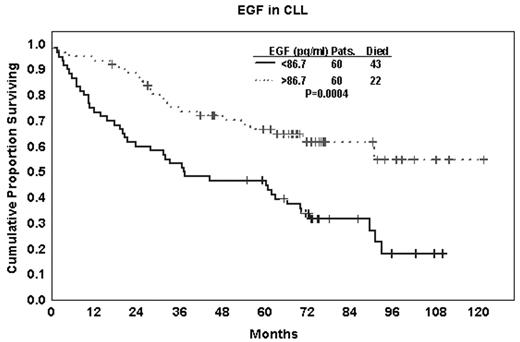Abstract
Epidermal growth factor (EGF) is a polypeptide expressed in various epithelial tissues and organs. EGF is believed to play an important role in cell development, differentiation, growth, apoptosis, and epithelial regeneration by the activation of signal transduction pathways that include PI3K/AKT, RAS/ERK, and JAK/STAT. These pathways may lead to both pro- and anti-apoptotic proteins. While hematopoietic cells do not express a significant amount of the EGF receptor (EGFR), bone marrow stromal cell and fibroblast expression of EGFR and EGF is important in the support of mesenchymal stem cell growth and colony formation. Since stromal cells play a major role in hematologic diseases, we evaluated the level of EGF in the plasma of 120 patients with chronic lymphocytic leukemia (CLL). EGF levels were significantly lower in CLL patients (median, 86.7; range, 2.2–500 pg/mL) than in 22 normal controls (median, 151.7; range, 35.1–389.1 pg/mL) (P = 0.02). EGF levels did not correlate significantly with β2-microglobulin (β2-M) level or IgVH mutation status, but correlated negatively with Rai stage (P = 0.0001). EGF level correlated positively with platelet count (R = 0.53, P <0.001) and negatively with WBC count (R = −0.32, P <0.001) as well as percent lymphocytes in bone marrow (R = −0.35, P <0.01). Using univariate Cox proportional hazards models, we demonstrated a negative correlation with survival when EGF was used as a continuous variable (P <0.001). The negative predictive value of EGF was independent of Rai stage, β2-M and thrombopoietin (TPO) level, IgVH mutation status, and prior therapy. EGF level as a continuous variable remained a strong predictor of survival (P <0.01) even when Rai stage, IgVH mutation status, β2-M and TPO levels, and prior therapy were included in the model. When dichotomized according to the median EGF level (86.7 pg/mL), patients with higher levels had longer survival (P <0.001). These data suggest that EGF levels are a powerful and independent prognostic factor in CLL and represent a simple and reliable approach to stratify patients for therapy. Further studies are needed to understand the biological basis of the role of the EGF in CLL to determine whether it reflects the general well-being of the host or the health of stromal elements in the bone marrow.
Disclosure: No relevant conflicts of interest to declare.
Author notes
Corresponding author


This feature is available to Subscribers Only
Sign In or Create an Account Close Modal